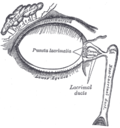Lacrimal canaliculi
Lacrimal canaliculi (singular: lacrimal canaliculus), also known as tear ducts, are part of the lacrimal apparatus that serves as the physical drainage pathway for tears. They are small, tubular structures that play a crucial role in the tear film's lifecycle, ensuring that tears can drain from the eye's surface into the nasolacrimal duct, eventually reaching the nasal cavity.
Anatomy[edit]
The lacrimal canaliculi begin at the puncta lacrimalia, tiny openings located on the lacrimal papilla near the inner corner of each eyelid. Each eye has two canaliculi, the upper and the lower, which drain tears from the respective upper and lower puncta. After originating from the puncta, the canaliculi travel vertically for a short distance (about 2mm) before making a sharp turn horizontally towards the lacrimal sac. This junction, where the canaliculi meet the lacrimal sac, is known as the ampulla. The canaliculi are lined with a mucous membrane, allowing for the smooth passage of tears.
Function[edit]
The primary function of the lacrimal canaliculi is to facilitate the drainage of tears from the eye's surface. Tears are produced by the lacrimal gland and spread across the eye's surface with each blink. These tears collect at the eye's medial (inner) corner, where they enter the puncta and subsequently the lacrimal canaliculi. Through a series of blinks, tears are pumped through the canaliculi into the lacrimal sac and down the nasolacrimal duct, ultimately draining into the nasal cavity. This process is essential for eye health, as it helps to remove debris and maintain a moist environment on the eye's surface.
Clinical Significance[edit]
Blockage or dysfunction of the lacrimal canaliculi can lead to dacryocystitis, an inflammation of the lacrimal sac, or epiphora, an overflow of tears onto the face. Causes of canaliculi dysfunction can include infection, inflammation, trauma, or congenital anomalies. Diagnosis of canaliculi issues may involve dacryocystography, a radiographic examination of the tear drainage system, or dacryoscintigraphy, a nuclear medicine test. Treatment options vary depending on the underlying cause but may include antibiotics for infection, surgery to remove blockages, or the insertion of a lacrimal stent or Jones tube to facilitate tear drainage.
See Also[edit]
References[edit]
<references/>
Lacrimal canaliculi gallery[edit]
-
Gray896
Ad. Transform your life with W8MD's Budget GLP-1 injections from $49.99


W8MD offers a medical weight loss program to lose weight in Philadelphia. Our physician-supervised medical weight loss provides:
- Weight loss injections in NYC (generic and brand names):
- Zepbound / Mounjaro, Wegovy / Ozempic, Saxenda
- Most insurances accepted or discounted self-pay rates. We will obtain insurance prior authorizations if needed.
- Generic GLP1 weight loss injections from $49.99 for the starting dose of Semaglutide and $65.00 for Tirzepatide.
- Also offer prescription weight loss medications including Phentermine, Qsymia, Diethylpropion, Contrave etc.
NYC weight loss doctor appointmentsNYC weight loss doctor appointments
Start your NYC weight loss journey today at our NYC medical weight loss and Philadelphia medical weight loss clinics.
- Call 718-946-5500 to lose weight in NYC or for medical weight loss in Philadelphia 215-676-2334.
- Tags:NYC medical weight loss, Philadelphia lose weight Zepbound NYC, Budget GLP1 weight loss injections, Wegovy Philadelphia, Wegovy NYC, Philadelphia medical weight loss, Brookly weight loss and Wegovy NYC
|
WikiMD's Wellness Encyclopedia |
| Let Food Be Thy Medicine Medicine Thy Food - Hippocrates |
Medical Disclaimer: WikiMD is not a substitute for professional medical advice. The information on WikiMD is provided as an information resource only, may be incorrect, outdated or misleading, and is not to be used or relied on for any diagnostic or treatment purposes. Please consult your health care provider before making any healthcare decisions or for guidance about a specific medical condition. WikiMD expressly disclaims responsibility, and shall have no liability, for any damages, loss, injury, or liability whatsoever suffered as a result of your reliance on the information contained in this site. By visiting this site you agree to the foregoing terms and conditions, which may from time to time be changed or supplemented by WikiMD. If you do not agree to the foregoing terms and conditions, you should not enter or use this site. See full disclaimer.
Credits:Most images are courtesy of Wikimedia commons, and templates, categories Wikipedia, licensed under CC BY SA or similar.
Translate this page: - East Asian
中文,
日本,
한국어,
South Asian
हिन्दी,
தமிழ்,
తెలుగు,
Urdu,
ಕನ್ನಡ,
Southeast Asian
Indonesian,
Vietnamese,
Thai,
မြန်မာဘာသာ,
বাংলা
European
español,
Deutsch,
français,
Greek,
português do Brasil,
polski,
română,
русский,
Nederlands,
norsk,
svenska,
suomi,
Italian
Middle Eastern & African
عربى,
Turkish,
Persian,
Hebrew,
Afrikaans,
isiZulu,
Kiswahili,
Other
Bulgarian,
Hungarian,
Czech,
Swedish,
മലയാളം,
मराठी,
ਪੰਜਾਬੀ,
ગુજરાતી,
Portuguese,
Ukrainian

